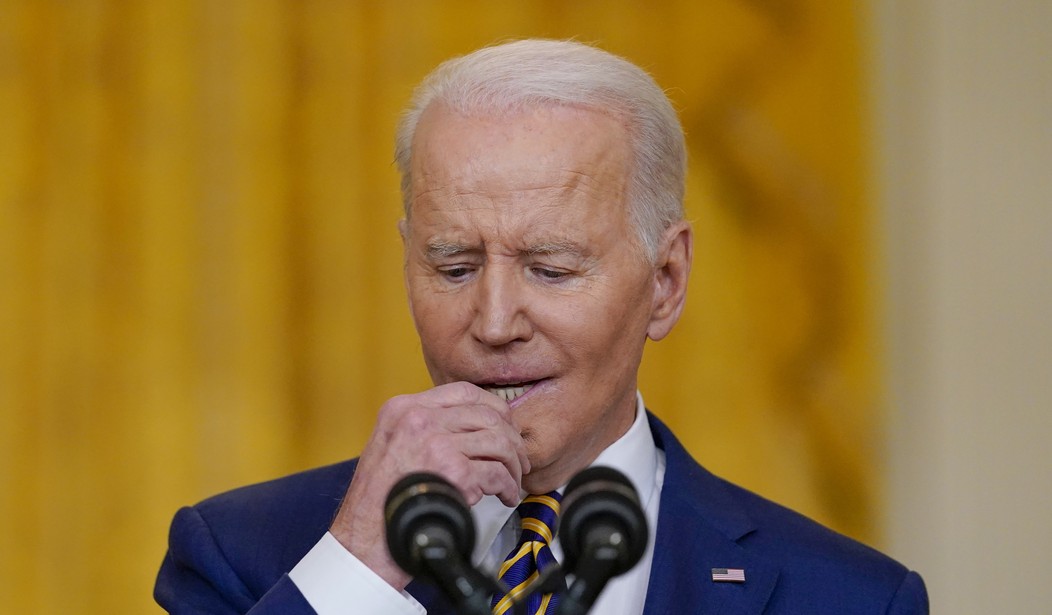Federal employees will not yet have to comply with Joe Biden’s vaccination/test mandate in order to keep their jobs. The Fifth Circuit, in a 2-1 decision, declined to stay an order from a Texas district court that blocked enforcement of the mandate.
This may well be moot by the time the appeal gets fully heard anyway:
A federal appeals court said Wednesday it would not reinstate President Joe Biden’s Covid-19 vaccine mandate for federal employees while it reviews a lower court’s order putting the requirement on hold — potentially setting the stage for the case to go to the Supreme Court.
The 5th US Circuit Court of Appeals did not explain its reasoning in the unsigned order that said the court was expediting its review of the case. The court said the Biden administration’s request to put the lower court’s ruling on hold was being “carried with the case,” signaling that the appeals court would not rule on the request until it had conducted a fuller review of the case.
The mandate, which applied to some 3.5 million federal workers, required full vaccination by the end of November, although the administration said it would first counsel employees who resisted vaccination rather than discipline or fire them. On December 9, the Office of Management and Budget said the federal workforce was 97.2% compliant with the mandate — a figure that included people who had pending or approved exemptions.
Technically, this is something of a mixed bag for the Biden administration. The same panel ordered an expedited hearing on the appeal and didn’t outright refuse a stay either. This is not a case in which an appellate panel judged a stay on the basis of the likelihood that one side or the other would prevail. The order referred the appeal and the stay request back to the circuit for scheduling another panel for the actual hearing, essentially leaving the entire matter for another trio of judges.
Nevertheless, Judge Stephen Higginson dissented, arguing that the district court misapplied a Supreme Court ruling blocking a Biden mandate on private-sector employees. Biden ordering a mandate as CEO of Fed Inc is a different matter, Higginson argued, and that should have been significant enough to grant the stay while the appeal is processed:
The President is not an unelected administrator. He is instead the head of a co-equal branch of government and the most singularly accountable elected official in the country. This federal workplace safety order displaces no state police powers and coerces no private sector employers. Instead, consistent with his Article II duty to “take Care that the Laws be faithfully executed,” the President is performing his role as CEO of the federal workforce, 7 taking executive action in order to keep open essential government buildings; 8 to maintain the provision of vital government services, such as the Transportation Security Administration; and to prevent unvaccinated federal employees from infecting co-workers or members of the public who, whether because of age or infirmity, might be highly vulnerable to hospitalization and death.
Federal employees that disagree with the content of Executive Order 14043 retain the right to claim an exemption, to leave the government’s employment, to collectively bargain, and to challenge the order through the CSRA. And, of course, any American that disagrees with the content of the order has the right to vote the President out of office. Thus, consistent with NFIB v. OSHA and Biden v. Missouri, accountability for the federal executive employee immunization requirement is open, obvious, and vested in one elected, democratically-accountable official. These two cases do not cast doubt on, but rather determinatively confirm, the President’s power to issue Executive Order No. 14043.
In addition to the issues discussed above, the government is also likely to succeed in showing that the plaintiffs have not met their burden for obtaining a preliminary injunction. A plaintiff seeking such an injunction must establish, among other requirements, “that he is likely to suffer irreparable harm in the absence of preliminary relief.” Winter v. Nat. Res. Def. Council, Inc., 555 U.S. 7, 20 (2008). However, even if the plaintiffs were to lose their jobs as a result of this order,9 we have explained in a previous case involving “discharge under the federal civil service laws” that “[i]t is practically universal jurisprudence in labor relations in this country that there is an adequate remedy for individual wrongful discharge after the fact of discharge”: “reinstatement and back pay.” Garcia v. United States, 680 F.2d 29, 31-32 (5th Cir. 1982). The CSRA makes this remedy available to the plaintiffs. See 5 U.S.C. § 7118(a)(7)(C). Accordingly, the plaintiffs cannot show that they are likely to suffer irreparable harm in the absence of preliminary relief.
For these three independent reasons, the Government has made a strong showing that its appeal is likely to succeed on the merits.
Higginson may well be correct on that point. Biden’s vaccine mandate on private employers was clearly unconstitutional, especially as crafted as an OSHA rule. A mandate on actual employees of the federal government may be no more desirable, but Biden’s authority likely extends that far for the reasons Higginson argues here. Employers have the right, within the law and in certain cases within boundaries of collective bargaining agreements, to set the terms of employment and the work environment. That’s true in both the public and private sectors.
However, there is one big flaw with Biden’s vaccination mandate: its rational basis. When Biden first proposed it, the CDC believed that vaccination prevented the transmission of COVID-19, which made vaccination a workplace-safety enhancement. We now know that vaccines, while extremely valuable to prevent serious and severe forms of acute infection, nevertheless have no impact on transmission. The CDC even acknowledges as much with Omicron and Delta. If that’s the case, then what is the rational basis for making vaccination or testing a requirement for access to the workplace? An appeal court will almost certainly delve pretty deeply into that question, not just whether Biden’s authority extends that far. And that fact also calls into question why a court would issue a stay, since it will have no real impact on anyone who’s been vaccinated already — and that’s 97% of the federal workforce, by the government’s own admission.
This will likely peter out before it gets much farther anyway. Biden’s mandates were ill-conceived at the time he made them, as later science has shown. They’re also getting more and more unpopular with an electorate that’s gotten sick and tired of authoritarian interventions that disrupt normal life for no real payoff at all. Biden will have to hit reverse on these orders at some point just to maintain any credibility at all. In this case, the initial three-judge panel might have done Biden a favor by punting on the stay and forcing him to recognize that this mandate is a waste of time and effort in the first place.








Join the conversation as a VIP Member